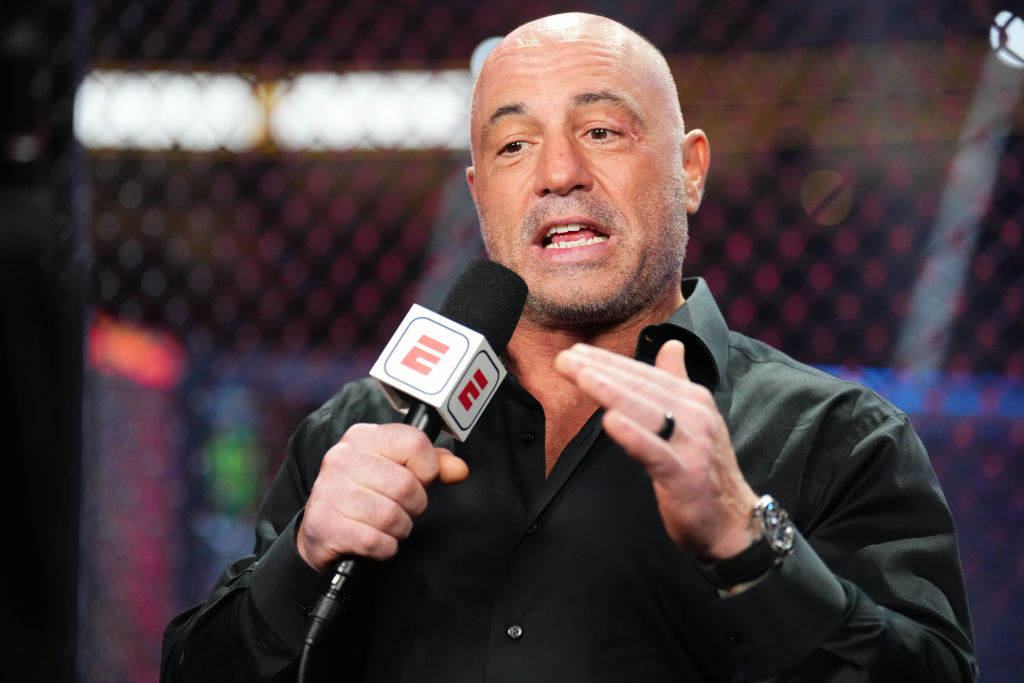Joe Rogan Defends Jason Aldean By Whitesplaining How Rap Music Is ‘Infinitely Worse’
Source: Chris Unger / Getty
In today’s episode of Joe Rogan Is Being Aggressively Caucasian Again, the podcaster who has amassed a wide audience by pretending to be smart is (surprise, surprise) joining the chorus of angry Caucasians who are scrambling to defend Jason Aldean’s happy-go-lynching “Try That in a Small Town” video. But Rogan is taking things a step further than other white com conservatives who, without a hint of irony or self-awareness, are crying about cancel culture as if the world of fragile right-wingers isn’t trying to cancel Black history, LGBTQA+ studies, drag queens, non-whitey-approved books, CRT, DEI, BLM and “wokeness” into white supremacist oblivion.
Instead, Rogan is deflecting to rap music.
“The level of outrage coming from people that are upset about that song is so strange when there are hundreds of rap songs out there that are infinitely worse, and also enjoyable…and no complaints at all,” Rogan said.
Joe Rogan Pushes Back on the Jason Aldean Critics
“The level of outrage coming from people that are upset about that song is so strange when there are hundreds of rap songs out there that are infinitely worse, and also enjoyable…and no complaints at all”@joerogan… pic.twitter.com/GZHOZNHjcU
— Chief Nerd (@TheChiefNerd) July 26, 2023
Let’s start with the most obvious counterpoint to what has to be one of the most disingenuous arguments in Obtuse White Man History.
Reeeeealy, Joe? No one has ever complained about rap music?
In 2002, Bill O’Reilly successfully used his platform on Fox News to pressure Pepsi to cancel their business relationship with legendary Atlanta rapper Ludacris and pull every single one of its ads that featured him from the airwaves. It took one day.
MUST WATCH: In 2002, Bill O’Reilly successfully pushed Pepsi to drop its sponsorship of @Ludacris calling him “a man who degrades women” pic.twitter.com/XjuxgQxXyV
— Yashar Ali (@yashar) April 5, 2017
The late 80s and 90s were so chock full of boycotts and public protests in favor of banishing NWA and 2 Live Crew from TV and radio that the latter rap group had to go to court in order to retain First Amendment rights for themselves and, subsequently, for rap music in general.
But, OK, all of those examples are decades old. How about something a little more recent?
One decade ago, Rick Ross lost endorsement deals and was compelled to apologize for rap lyrics that suggested he made a habit of drugging and sexually assaulting women. This all happened as a result of the massive outrage that the rapper’s cringey and disgusting “bars” prompted.
Even more recently, Cardi B’s “WAP” drew the widespread ire (or closeted DESire) of white conservative America and respectability politics-humping Black people alike.
Black women have, for decades, criticized misogynoir in rap music, and Black people, in general, have feared what gangster rap music is doing to the Black community and Black youth (which is obviously debatable). White people have criticized rap music because their kids love it and because they think the only type of rap music in existence is the kind that is violent, drug-promoting and degrading of women. They’ve even erroneously blamed mass shootings on rap music.
In short: There has literally never been a time in rap music history that rap music wasn’t being complained about.
At any rate, Hip-Hop/rap provides stories about the Black community told (mostly) by members of the Black community. Rap music represents a reflection of the positive, the negative, the beautiful, the gruesome, the hopeful and the depraved, in terms of what’s going on in the reality of the environments rap music comes from. It wouldn’t be a surprise if people didn’t find it as offensive as a country music song with strong lynching vibes filmed in front of a courthouse where a Black teen was literally lynched.
Granted, a lot (probably most) gangster rappers are lying or at least embellishing in their rhymes, which is, honestly, the only thing they have in common with Jason Aldean, who was born and raised in Macon, Georgia, which has a population of nearly 160,000. Aldean is not even from a small town, which essentially makes him the country music version of a studio gangsta.
Actually, that reminds me of another point regarding white conservative hypocrisy (and, yes, at this point, I regard Rogan as a full-blown right-winger). MAGA World has its Confederate flag drawers all in a bunch because a country music singer got “canceled” due to his social and/or political views. What exactly do these people think happened to The Chicks (formerly known as The Dixie Chicks)? Aldean had one video pulled from CMT’s platform because it propagandized Black Lives Matter protests and promoted extrajudicial executions. The Chicks all but lost their careers because one of them talked bad about George W. Bush. But, no, I’m sure conservatives are being completely honest with themselves when they say they hate “cancel culture.”
Anyway, it isn’t surprising that Rogan—the guy who repeatedly used the N-word on his podcast, made racist and stereotypical remarks about Africans and referred to a Black neighborhood as The Planet of the Apes—has pivoted to rap music in deflecting from Aldean criticism.
It sounds about white, actually.
SEE ALSO:
Jason Whitlock, Candace Owens Chide Black People And White Liberals To Defend Joe Rogan
Spotify CEO Apologizes To Staff For Joe Rogan Racism, But Makes It Clear He Is Here To Stay
The post Joe Rogan Defends Jason Aldean By Whitesplaining How Rap Music Is ‘Infinitely Worse’ appeared first on NewsOne.

